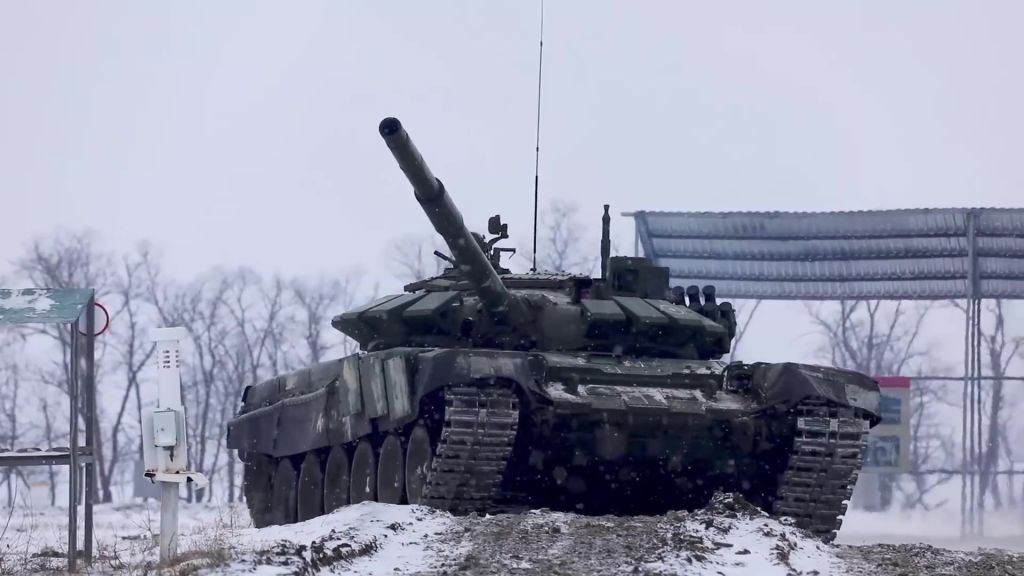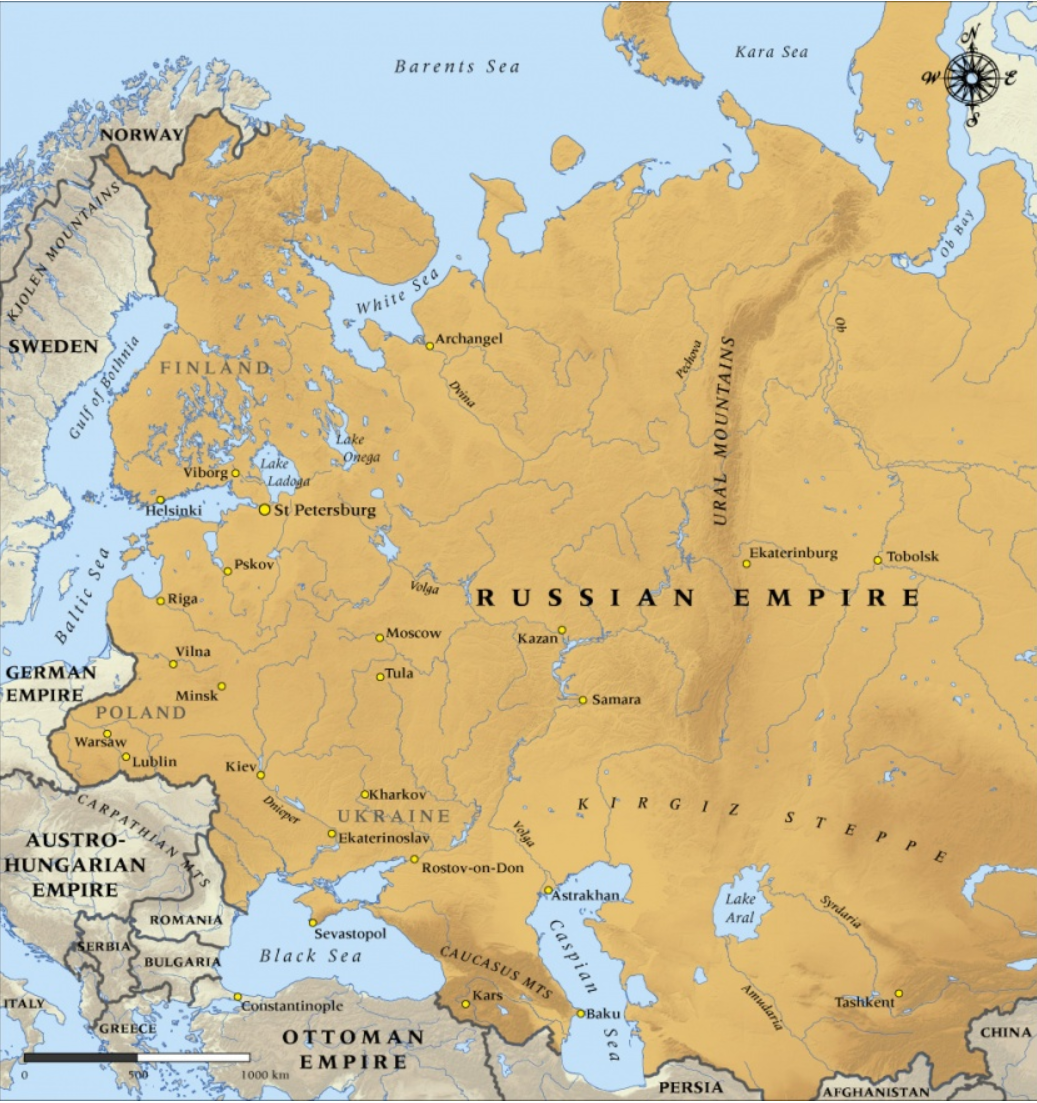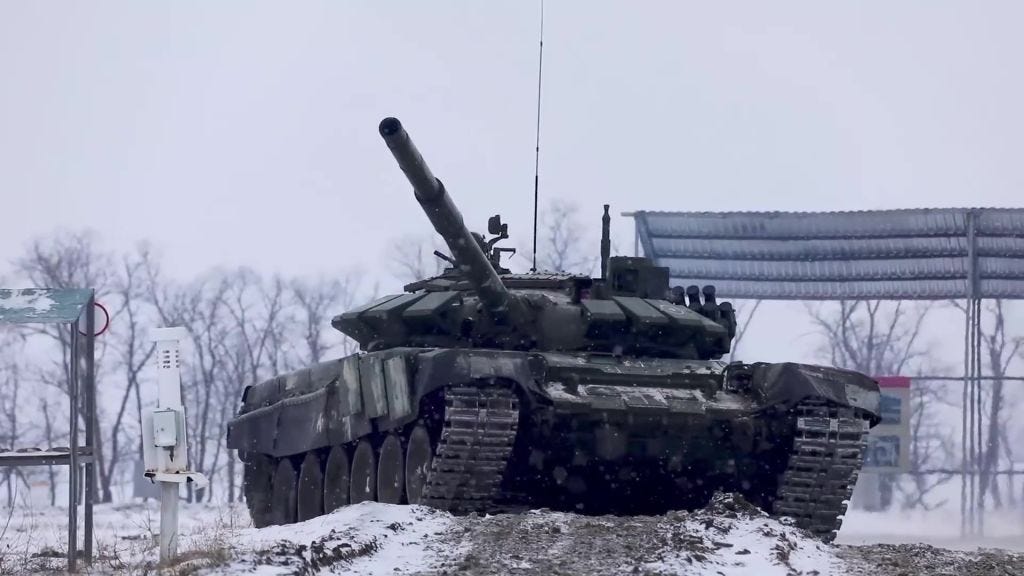Note: Today’s newsletter is about a situation that is extremely fluid and unfolding against the backdrop of all the normal confusion that accompanies the fog of war. At The Dispatch, we’re monitoring developments by the minute, and we invite all of our members to join us for Dispatch Live this evening. I’ll be hosting and will start by interviewing the American Enterprise Institute’s Klon Kitchen, one of our nation’s leading national security analysts. Jonah and Steve will join for the remainder of the program, and we’ll take as many questions as we can. Please join us tonight.

I don’t know if you had an opportunity to read a translation of Vladimir Putin’s speech to the Russian people last night, but I’d encourage you to do so. It’s a sobering, illuminating address, and it should yank all of us out of our partisan foxholes to help us understand Putin’s true “grievances” and his true strategic aims.
Now, I’m asking you to understand Putin’s speech fully cognizant that the man is a font of disinformation. His regime will lie (and kill) remorselessly to provide pretexts for aggressive military action. Moreover, his lies certainly aren’t limited to current operations: His view of history too is full of misinformation and omission. But that view is nonetheless vital to understand.
Here are the key words, which are right at the top of the speech:
I would like to emphasize again that Ukraine is not just a neighboring country for us. It is an inalienable part of our own history, culture and spiritual space. These are our comrades, those dearest to us—not only colleagues, friends and people who once served together, but also relatives, people bound by blood, by family ties.
Since time immemorial, the people living in the southwest of what has historically been Russian land have called themselves Russians and Orthodox Christians. This was the case before the 17th century, when a portion of this territory rejoined the Russian state, and after.
More:
So, I will start with the fact that modern Ukraine was entirely created by Russia or, to be more precise, by Bolshevik, Communist Russia. This process started practically right after the 1917 revolution, and Lenin and his associates did it in a way that was extremely harsh on Russia—by separating, severing what is historically Russian land. Nobody asked the millions of people living there what they thought.
Putin’s story, told at some length, is relatively simple to recount. The Soviet Union constructed Ukraine as a Soviet republic essentially out of whole cloth, a decision born in desperation, when the emerging communist regime was attempting to hold on to power at all costs.
Thus, Vladimir Putin’s core problem with Ukraine is not with its western alliances, but with its independent existence. According to Putin, the current map of Russia simply isn’t accurate. A “true” map of Russia would include a large segment of Ukraine itself. To put it another way, large parts of the old Russian Empire, Putin simply calls “Russia.” The same principle applies to large parts of the old Soviet republics. They’re “Russia” to Vladimir Putin.
Where does he get this idea? Putin, in his speech, looks backwards to the very creation of the so-called Union of Soviet Socialist Republics (the USSR) and calls into question the creation of the so-called socialist republics themselves. This, in his view, was a founding catastrophe, one that couldn’t even be fully undone by Stalin’s autocratic reign. Stalin ruled with an iron fist, but he did not eradicate the socialist republics, and the seeds of nationalism were sown:
What Stalin fully implemented was not Lenin’s but his own principles of government. But he did not make the relevant amendments to the cornerstone documents, to the Constitution, and he did not formally revise Lenin’s principles underlying the Soviet Union. From the look of it, there seemed to be no need for that, because everything seemed to be working well in conditions of the totalitarian regime, and outwardly it looked wonderful, attractive and even super-democratic.
(Here we pause for a rueful laugh at the idea that Stalin’s regime seemed “wonderful, attractive, and even super-democratic.”)
Again, according to this story, the various socialist republics of the old USSR weren’t truly real. They were artificial constructs, born out of perceived revolutionary necessity during the Bolshevik Revolution. According to Putin, none of the succeeding Soviet leaders had the wisdom to eradicate these political fabrications, and it is thus deeply offensive to him that these alleged fabrications now purport to assert an independent identity.
To put this in perspective, let’s look at some maps. First, here’s the Russian Empire in 1914, before the dramatic changes wrought by the Treaty of Brest-Litovsk, the capitulation to Imperial Germany that ended Russian involvement in World War I:

What do you notice? There’s no independent Ukraine. It simply doesn’t exist. (There’s no independent Poland or Finland either, and the Baltic states are nowhere to be found.) I’m not necessarily arguing that Putin thinks that all this territory should be within the “true” map of Russia, but if you’re a citizen of any of those nations, you can understand their alarm.
Now let’s look at a map of the USSR contrasted with the current map of Russia itself.

There are two things to think through here. First, let’s just go ahead and correct Putin’s version of history. Michael Schwirtz, Maria Varenikova and Rick Gladstone did an excellent job of providing more context in the New York Times yesterday. As even the map of the Russian empire demonstrates, Ukraine was not wholly Russian. Indeed, while eastern regions of Ukraine were long part of the Russian empire, other regions were part of the Austro-Hungarian empire. As the Times report states:
The historical reality of Ukraine is complicated, a thousand-year history of changing religions, borders and peoples. The capital, Kyiv, was established hundreds of years before Moscow, and both Russians and Ukrainians claim it as a birthplace of their modern cultures, religion and language.
And:
Ukrainian identity politics and nationalism have been irritants in Russia since the feudal czarist times that predated the Russian Revolution. Ukraine is seen by many Russians as their nation’s “little brother” and should behave accordingly.
Moreover, the idea that modern Ukraine was functionally granted autonomy by the USSR is pure fiction: “It was not Moscow that granted Ukraine’s independence in 1991, but the Ukrainian people, who voted resoundingly to leave the Soviet Union in a democratic referendum.”
And that brings us to the second implication, which casts the NATO expansion argument in a wholly different light. It’s not that Russia is truly fearful that its present borders will shrink–that it has to defend itself from NATO attack. Indeed, such a position makes little sense given the actual disposition and composition of NATO forces. They are simply not forward-deployed. Instead the troops closest to Russia exist as little more than “trip-wire” or “speed-bump” defensive formations that demonstrate our commitments without offering any remotely credible offensive threat.
In addition, there’s the important matter of Russia’s still-large nuclear arsenal. Offensive operations into a nuclear-armed Russia wouldn’t just be difficult and impractical (possible only after a huge buildup that would be visible to the entire world), they would be absolute madness.
But here’s what NATO expansion actually represents in the Putin world view—something akin to a permanent partition of the Russian nation. In this view, when NATO expands eastward, it’s not just expanding close to Russian soil, but onto Russia itself. Another way to put it is that Putin’s fundamental problem is with an independent Ukraine, not with NATO, and NATO is a threat mainly because it has the potential—one day—to guarantee the existence of an independent Ukraine.
Think of the instability and aggression inherent in Putin’s world view. Self-determination is irrelevant. Even if the people of Ukraine assert an independent national identity, as they did in 1991, that’s rendered irrelevant by Putin’s own version of history and his ideas of Russian nationality.
Even worse, from Putin’s perspective democracy is a threat. Thriving democratic states next to Russia represent a living, breathing repudiation of Russia’s autocratic model. The more an independent, democratic Ukraine thrives (and it has a long way to go before it is comparable to EU member states), the more its very existence inspires internal Russian opposition. It demonstrates that there is a better way.
There’s a lively and interesting argument as to whether Putin is more czarist than he is Soviet (analogies are imperfect, but I think czarist is the better comparison). But either way, he’s undeniably expansionist. He believes current Russian borders are a farce. And it is absolutely the case that aggressive expansionism in Europe has been the seed for the most catastrophic conflicts the world has ever endured.
Why walk through all of this? Because it’s vitally important to know that the primary provocation in the Putinist worldview isn’t NATO expansion, but rather the combination of the collapse of the Russian and Soviet empires and the resulting self-determination and independence of Russia’s former imperial vassals. That’s what he wants to reverse.
The challenge of the west is how we preserve the right of self-determination and independence of free peoples without provoking war with a nuclear Russia. Leaving the former republics to fend for themselves means oppression, domination, invasion, and–now–potential land warfare not seen in Europe since 1945.
And we know from history that a grim realpolitik that leaves the great powers to gobble up small nations does not enhance international peace and stability. It sows the seeds of world war.
At the same time, it doesn’t mean that our own long-term strategic choices are obvious. Selectively absorbing eligible former republics into NATO guarantees their peace and freedom (at least for now). Each expansion snatches more of “Russia” out of Putin’s hands, robbing him of the empire he longs to recreate. Yet expansion has to be carefully managed. Each move east provokes Putin, and there are obvious limits to our own national will and power.
But as Russian armored vehicles roll into Ukraine, solidifying Russian control of the Donbas, and as Russian forces appear poised to launch an offensive into unoccupied portions of Ukraine, one thing is clear–short of war, the United States must do what it can to help Ukraine to fight. Cripple Russia with sanctions. Supply Ukrainians with arms. Teach Vladimir Putin that the Russian empire is gone forever, borders are real, nations aren’t defined by his whims, and that a free people have a right to define and defend their own national home.
As always, the risks of war do not all run one way. Putin’s actions aren’t just a threat to Ukraine. They’re a threat to Putin. He may realize this as well, which is why a large-scale invasion is not quite yet a foregone conclusion. If he extends himself too far, and if western and Ukrainian resolve hold, the resulting economic and military losses just might turn Ukraine into the graveyard of his regime.







Please note that we at The Dispatch hold ourselves, our work, and our commenters to a higher standard than other places on the internet. We welcome comments that foster genuine debate or discussion—including comments critical of us or our work—but responses that include ad hominem attacks on fellow Dispatch members or are intended to stoke fear and anger may be moderated.
With your membership, you only have the ability to comment on The Morning Dispatch articles. Consider upgrading to join the conversation everywhere.